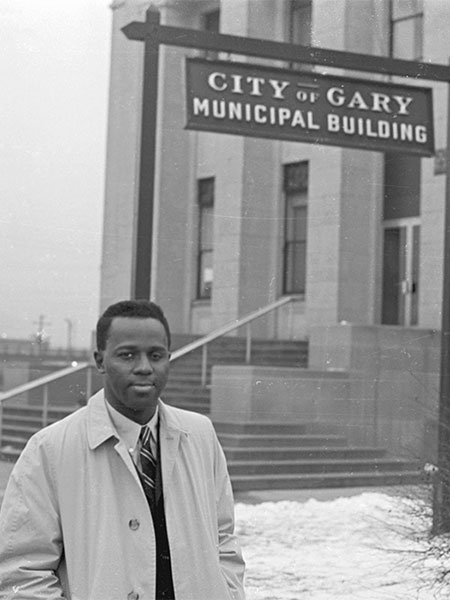The election of Nov. 7, 1967, was a milestone in U.S. political history, as Gary, Ind., chose Richard G. Hatcher, BS’56, as mayor. He would serve as chief executive of the city for 20 years and inspire a generation of future Black leaders, but the seeds of his future accomplishments were sown at Indiana University.
Hatcher was born the youngest of 13 children in the summer of 1933 in Michigan City, Ind. Six of his siblings died before he left home, and the introverted Hatcher was plagued by a speech impediment and blindness in one eye. Nonetheless, Hatcher gained recognition in high school for his athletic prowess and was awarded a track scholarship to IU in 1951.
Balancing academics, athletics, and part-time employment, Hatcher frequented the dean’s list while an undergraduate. More importantly, his ascension as a Black politician and civil rights activist took root while he was in Bloomington, where he joined with the NAACP to picket Nick’s English Hut, which was segregated at the time.

His activism continued the rest of his life, from sit-ins he organized while a law student at Valparaiso University, to the policy initiatives he championed as a public official in Gary, aimed at improving the housing, health care, and education for the poor and minority residents.
After passing the Indiana bar in 1959, he set up a private law practice in Gary and rose to deputy prosecutor in 1961. He was elected to the city council in 1963, and, in 1967, won the Gary mayor’s race, joining Carl Stokes, of Cleveland, as the first Black mayors of major U.S. cities.
After leaving public office in 1987, Hatcher served successive stints at several centers of higher education, including Harvard University, Cambridge University, Valparaiso University, and Indiana University.
Hatcher, who died Dec. 13, 2019, at the age of 86, was executive director of the NAACP in the late 1970s, and chair of the campaign for the Rev. Jesse Jackson’s bid for president in 1984.
“Richard was a transformative figure in so many ways,” Jackson said in a statement. “[He] brought all these people who didn’t know each other and made Gary the centerpiece of our movement. Truth be told, he was our foundation. He changed the culture.”
This article originally appeared in the Spring 2020 issue of the IU Alumni Magazine. It is now part of our Black History Month series, IU’s Black History Makers.
